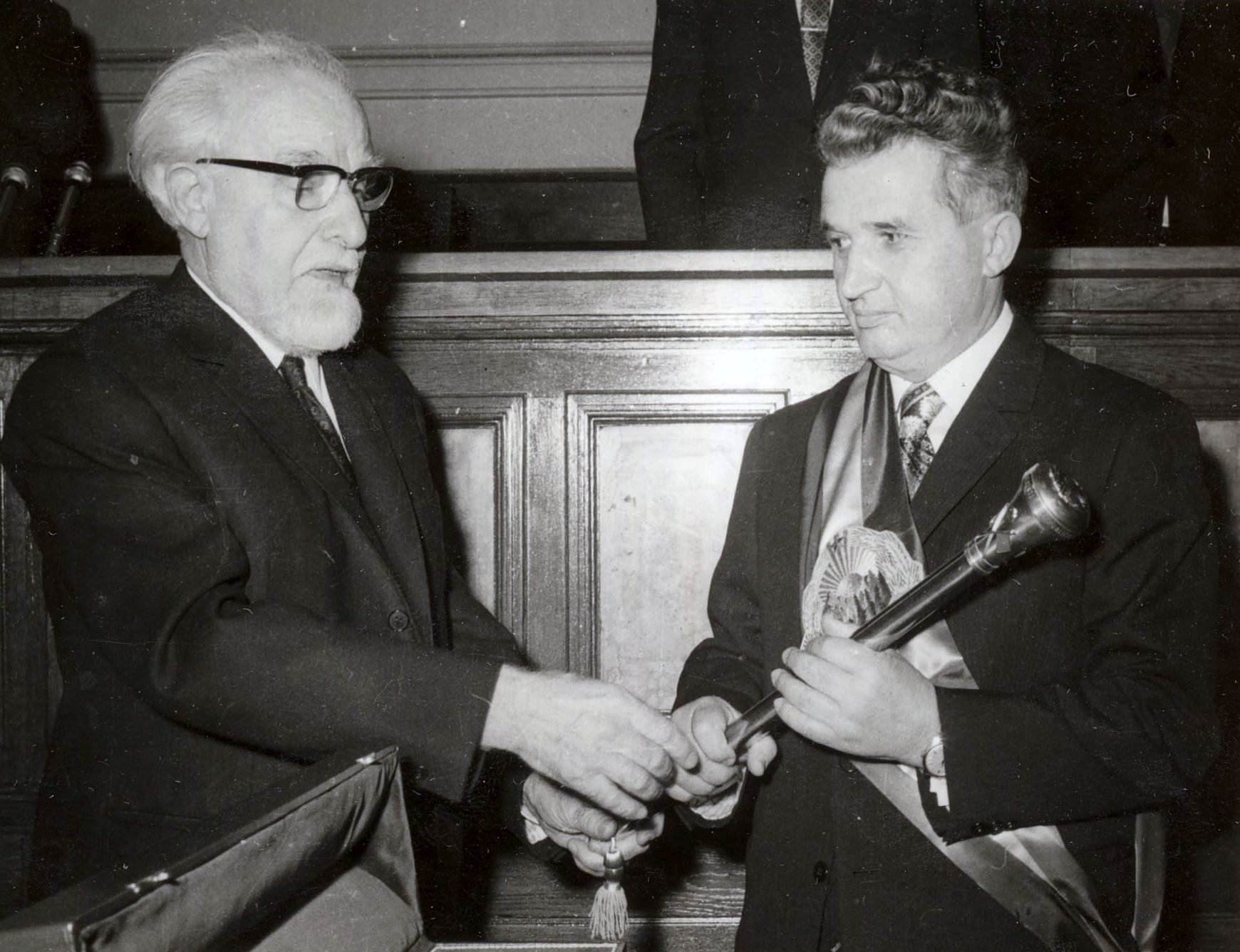Voitec, Ştefan
Enlarge text Shrink text- Dobrogeanu-Gherea, C. Opere complete, 1976- :v. 8, t.p. verso (Ștefan Voitec)
- Voitec, Ştefan:(A handwritten letter from 1946 in ARC. 4* 1976 - Collection of Jewish Romanian Intellectuals' Private Papers.)
- Wikipedia February 9th, 2017:"Ştefan Voitec (June 19, 1900 - December 4, 1984) was a Romanian socialist and communist journalist, politician, and statesman of Communist Romania. Born in Corabia, Voitec and was active in the Socialist Party of Romania, the Social Democratic Party (PSDR), and, after 1928, in Constantin Popovici's Unitary Socialist Party.Trained as a schoolteacher, he also worked on PSDR newspapers, before retiring from political life during World War II and Ion Antonescu's dictatorship (see Romania during World War II). An advocate of the union between the PSDR and the Romanian Communist Party (PCR), he was Minister of Education - appointed with communist backing in Constantin Sănătescu's post-war government, and remaining in office through subsequent cabinets until the official disestablishment of the Kingdom of Romania. His mandates were marked by an officially-endorsed Stalinist campaign in education, as well as by measures taken to remove and replace non-communist teachers and professors. In 1946-1947, he was a member of the Gheorghe Tătărescu-led Romanian delegation to the Paris Peace Conference, and, in fact, one of the signatories of the Peace Treaty with Romania. Together with Lothar Rădăceanu, he led the wing of the PSDR that called for an alignment with PCR policies, causing the split with Constantin Titel Petrescu's Independent Socialist Party in March 1946; the main PSDR was absorbed by the PCR in November 1947. Together with Constantin Ion Parhon, Mihail Sadoveanu, Gheorghe Stere, and Ion Niculi, Voitec was a member of the People's Republic Presidium - created by Law No. 363 after the forced abdication of King Michael I on December 30, 1947. He served as Deputy Prime Minister in Petru Groza's second cabinet, but was sidelined after falling out of favor with the Soviet leader Joseph Stalin. Returning to prominence after 1953, he occupied important positions ...".
Ștefan Voitec (also rendered Ștefan Voitech, Stepan Voitek; June 19, 1900 – December 4, 1984) was a Romanian Marxist journalist and politician who held important positions in the state apparatus of Communist Romania. Debuting as a member of the Socialist Party of Romania in his late teens, he formed the Socialist Workers Party of Romania, then the United Socialist Party, while also engaging in human rights activism and advocating prison reform. The mid-1930s brought him into contact with the Romanian Communist Party, with whom he formed tactical alliances; however, he rejected its political line, and was for a while known as a Trotskyist. In 1939, he joined the consolidated Social Democratic Party, which reunited various socialist groups outlawed by the National Renaissance Front. During World War II, despite ostensibly withdrawing form political life to do research, Voitec served as the party's Secretary and joined the anti-fascist underground. Some reports suggest that he was also a committed anti-communist, critical of the Soviet Union to the point on endorsing war in the East. As a war correspondent, Voitec made contributions to Nazi propaganda, an issue which made him vulnerable to blackmail in later decades. From June 1944, Voitec played a part in plotting the Anti-fascist Coup, negotiating a unified platform with communist Lucrețiu Pătrășcanu. Following this regime change, he emerged as a leader of the legalized Social Democrats. In November, he became Minister of Education, serving under increasingly communized governments to December 1947. Himself won over by Marxism-Leninism, Voitec directed a purge of the teaching staff, and engineered his party's alliance with, then absorption by, the Communist Party. Voitec was a member of the unified group's Politburo, and represented Dolj County, then Electroputere factory, in the Great National Assembly; he also served as member of the first republican presidium in 1948, and was briefly the Deputy Prime Minister to Petru Groza. Criticized for his leniency and inconsistencies in applying party dogma, he was sidelined and placed under Securitate surveillance in the early 1950s. After serving as head of Centrocoop, which grouped Romania's consumers' cooperatives, Voitec returned to the forefront in 1955–1956, when he was reappointed minister, then Deputy Premier. In 1961, Gheorghe Gheorghiu-Dej also included him on the State Council, as Assembly Chairman. As such, Voitec sanctioned the rise of Nicolae Ceaușescu, participating in his investiture as the first President of Romania (1974). Though his offices were by then largely ceremonial, he used his position to demand privileges for other former Social Democrats, and also obtained reconsideration for Constantin Dobrogeanu-Gherea, the Romanian Marxist classic. Shortly before dying of cancer in 1984, Voitec reportedly expressed regret for his communist conversion, which led to his second marginalization by Ceaușescu. He is remembered for his contributions to cultural development, responsible in large part for the establishment of Craiova University, the National Theater Craiova, and Magazin Istoric journal.
Read more on Wikipedia >
 Personality
Personality









